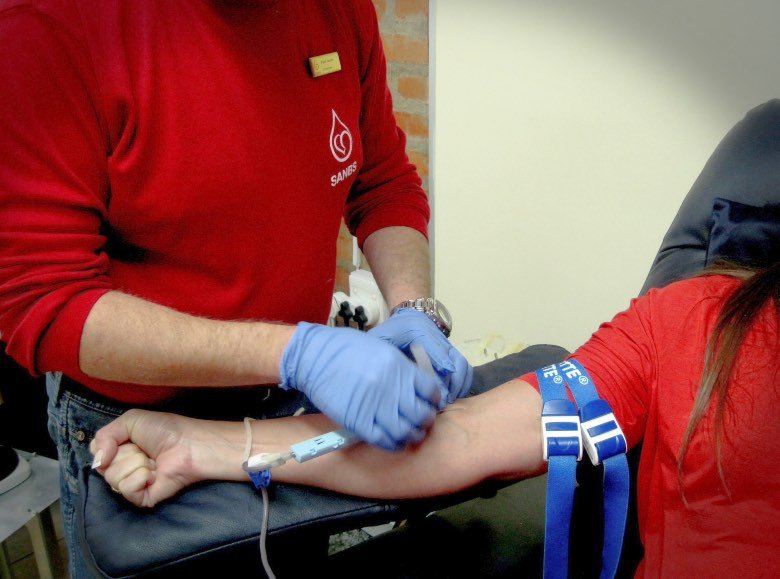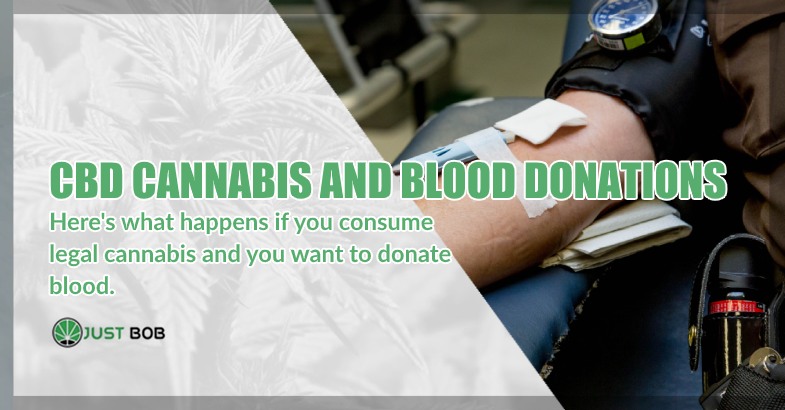Modified on: 05/01/2024
CBD AND BLOOD DONATION? HERE’S WHAT HAPPENS IF YOU CONSUME LEGAL CANNABIS AND YOU WANT TO DONATE BLOOD.
Blood donations are essential for people who, due to a particular disease or emergency, are in extreme need of transfusions. You know this well, and that is why you would like to go and donate blood at a blood-collect centre, but taking CBD cannabis stops you from doing so.
In fact, concerning the use of marijuana with high THC content the decree-law on blood donations speaks clearly: it is necessary to temporarily suspend such donations so that the concentrations of tetrahydrocannabinol in the blood are entirely disposed of.
So, if you have asked yourself “Can you donate blood after smoking a joint?”, the answer is no! You have to wait at least two weeks, and a doctor will tell you after the pre-donation tests whether you can donate or not.
What are the effects of cannabis on the body and blood?
The effects of cannabis on the body and blood have been a subject of extensive research. While cannabis use is generally considered safe for many individuals, certain aspects may impact blood donation eligibility and have implications for overall health.
When it comes to blood donation, individuals who use cannabis may encounter specific considerations. The use of cannabis does not necessarily disqualify someone from donating blood, but it’s essential to consider other factors. Donors must be in good health, free from symptoms of illness, and not under the influence of substances like alcohol or drugs during the donation process.
Cannabis use can influence various physiological aspects, including blood pressure. Some studies suggest that cannabis may cause a temporary increase in heart rate and blood pressure shortly after use. Individuals with pre-existing high blood pressure may want to consult with healthcare professionals before considering blood donation.
Furthermore, cannabis use may affect the cardiovascular system, potentially impacting factors such as blood vessel function and the oxygen-carrying capacity of red blood cells. While these effects are generally temporary, they underscore the importance of disclosing cannabis use during the donor screening process.
It’s crucial for individuals to be transparent about their medication history during the blood donation eligibility screening. Certain prescribed medications may interact with cannabis or have specific implications for the donation process.
Blood donation organizations, such as the Red Cross, often have guidelines in place to determine whether an individual is eligible to donate blood based on factors like recent travel history, exposure to infectious diseases, or the use of certain medications.
While cannabis use itself may not automatically disqualify someone from donating blood, potential donors should be aware of the effects of cannabis on blood pressure and overall health. Full disclosure during the screening process is essential, and individuals are encouraged to consult with healthcare professionals if they have concerns about how cannabis use may impact their eligibility to donate blood.
Marijuana intake and blood donation


The protocol that regulates blood donations in the UK provides for their temporary suspension in particular situations. Such eventualities are many! Among them, we find, for example, the flu, pregnancy, the use of specific drugs and occasional exposure to cannabinoids.
Specifically, the use of cannabinoids involves a temporary suspension of blood donations for at least 14 days (even if it is a doctor who gives his final opinion about the possibility to donate). Of course, people taking “heavy” drugs are entirely excluded from donations.
As you probably know, there are hundreds of active ingredients in marijuana. However, there are two that interact mainly with our endocannabinoid system: THC (tetrahydrocannabinol) and CBD (cannabidiol).
THC is a psychotropic cannabinoid. Therefore, it alters our perception of reality and our senses. CBD, on the other hand, does not have psychoactive effects but acts mainly on the body with anti-inflammatory, pain-relieving, anticonvulsant and many others.
We want to specify that the amounts of THC present in CBD marijuana or hashish are derisory, as they do not reach 2%, while the CBD percentages are usually high.
We also specify that the blood donation law decree considers light drugs (i.e. marijuana) high in THC, but for the moment, it does not speak about CBD weed. However, soft drugs and blood donation are incompatible.
Read also: CBD Cannabis and appetite: 3 reasons to consider using it if you’re not hungry
Why can’t people who take marijuana (temporarily) give blood?


The reason is simple: cannabinoids are substances that influence metabolism and blood flow, and with transfusions, they can come into contact with the blood of the recipient. It is not the case that a person who undergoes transfusions – and who can present the most diverse problems – receives blood contaminated with cannabinoids.
Although CBD is not a psychotropic substance, it increases blood flow and influences the metabolism similarly to THC. Therefore, even users of legal weed should avoid donating blood for at least two weeks after taking it.
As far as the intake of medical cannabis is concerned, the discourse is slightly different. In fact, in the UK, it is not possible to use medical marijuana in the form of inflorescences. These are sent already shredded to laboratories and pharmacies, which make galenic drugs with precise THC and CBD concentrations.
Cannabinoid concentrations in marijuana drugs are usually low. But there is a problem: it is the diseases for which these drugs are taken that could lead to the inability to donate blood. It is the doctor who selects Avis to decide whether the person taking marijuana for medical purposes can proceed with the donation.
Read also: CBD Shatter: what is it and why is everyone talking about it?
How the THC and CBD cannabinoids affect our metabolism and blood circulation.
It is scientifically known that THC and CBD interact significantly with the CB1 and CB2 receptors of the Endocannabinoid System in our body. CB1 receptors are involved in metabolism and are present in the central nervous system, while CB2 receptors are related to bone metabolism and the immune system.
As you can imagine, these receptors are involved in many processes, including the regulation of perceived pain, liver function, the functioning of the cardiovascular system and the metabolism regulation.
If THC and CBD interact with CB1 and CB2, it follows that they can dramatically improve our metabolism and allow us to manage energy savings better. Therefore, they are very good at preventing metabolic problems and obesity.
Furthermore, the activation of CB2 can lower the risk of atherosclerosis as it reduces the accumulation of plaque in the arteries. At the same time, however, CB1 activation may increase this risk.
Both the change in metabolism and the cardiovascular risk is undoubtedly not appropriate situations for people undergoing transfusion, whether it is a regular or emergency transfusion.
Therefore, if you consume CBD flowers or marijuana high in THC, you should avoid giving blood for at least 14 days after taking it. The medical examiner may also prohibit you from donating blood if you use cannabis regularly.
What medications Cannot be taken when donating blood?
When it comes to donating blood, certain medications may affect eligibility. Before giving blood, it’s essential to consider factors such as prescribed medication, medical conditions, and recent treatments.
Blood donation organizations, like the Red Cross or the Irish Blood Transfusion Service, often have guidelines in place to ensure the safety of both donors and recipients. Individuals with medical conditions or those taking specific medications, including antibiotics or drugs that necessarily disqualify them, might be temporarily ineligible to donate blood.
For instance, donors with high blood pressure or low blood pressure may need to wait until their condition is stable or well-managed before giving blood. Similarly, recent treatments, such as organ transplants or successful cancer treatments, may necessitate a waiting period before donating.
Smoking cigarettes or using cannabis does not necessarily disqualify someone from blood donation. However, individuals who have engaged in risky behaviors, such as unprotected sexual contact or drug use via needle sharing, may need to wait for a specified period before becoming eligible.
Potential donors who have recently traveled to certain countries may be asked to wait due to concerns about infections that could be present in their blood. Moreover, those who have been in contact with individuals with infectious diseases, like cold sores, may also be asked to postpone their donation.
It’s crucial for individuals to be in good health when donating blood. If someone is pregnant, under the influence of alcohol or drugs, or currently experiencing symptoms of illness, they may be temporarily ineligible.
In conclusion, while many individuals are eligible to donate blood and contribute to the noble cause, factors such as medication, recent treatments, and health conditions may impact eligibility. Potential donors are encouraged to contact blood donation clinics, follow guidelines provided by organizations like the Red Cross, and answer screening questions honestly to ensure the safety of donated blood and the well-being of both donors and recipients.
If you would like to learn more about the topic and also have more information about our CBD online shop, you will find detailed and interesting articles on the topic on our popular blog pages and website: JustBob.









